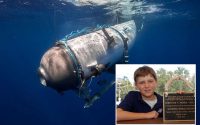Australian man who fell ill at Antarctic base returned home after rescue mission
An Australian who fell ill at a remote Antarctic base is returning home on an icebreaker following a daunting mission to rescue him, authorities said Tuesday.
The man was working at the Casey research station when he suffered from what authorities described as a developing medical condition that needed specialist assessment and care.
The icebreaker RSV Nuyina left Australia last week and traveled south more than 1,800 miles, breaking through sea ice to reach a location 89 miles from the base, the Australian Antarctic Division said in a statement.
From there, two helicopters were deployed from the deck Sunday and arrived at the base after nearly an hour to rescue the man.
“The first phase of the evacuation was performed safely and successfully and the ship is now on the return voyage to Hobart,” said Robb Clifton, the division’s acting general manager of operations and logistics. “Getting this expeditioner back to Tasmania for the specialist medical care required is our priority.”

The man is expected to arrive in Australia next week.
Until then, Clifton said, he would be cared for in the icebreaker’s specially equipped medical facility by polar medicine doctors and staff from the Royal Hobart Hospital.
Authorities said they weren’t divulging the man’s name or medical condition to protect his privacy.

During the southern summer, more than 150 people work at the Casey research station. But over the winter, fewer than 20 remain to perform maintenance work.
The division said all other people working at Australian bases in Antarctica were accounted for and safe.


